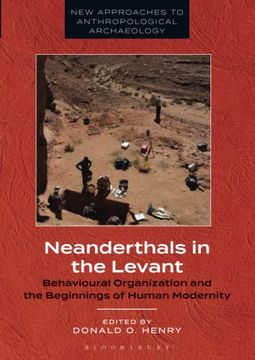Share
Neanderthals in the Levant: Behavioural Organization and the Beginnings of Human Modernity (New Approaches to Anthropological Archaeology)
Henry Donald O. (Author)
·
Bloomsbury Academic
· Paperback
Neanderthals in the Levant: Behavioural Organization and the Beginnings of Human Modernity (New Approaches to Anthropological Archaeology) - Henry Donald O.
Choose the list to add your product or create one New List
✓ Product added successfully to the Wishlist.
Go to My Wishlists
Origin: U.S.A.
(Import costs included in the price)
It will be shipped from our warehouse between
Tuesday, June 25 and
Monday, July 08.
You will receive it anywhere in United Kingdom between 1 and 3 business days after shipment.
Synopsis "Neanderthals in the Levant: Behavioural Organization and the Beginnings of Human Modernity (New Approaches to Anthropological Archaeology)"
This significant contribution to scholarship on the Middle Paleolithic, now reissued with a new preface, traces the controversy that revolves around the bio-cultural relationships of Archaic (Neanderthal) and Modern humans at global and regional, Levantine scales. The focus of the book is on understanding the degree to which the behavioral organization of Archaic groups differed from Moderns. To this end, a case study is presented for a 44-70,000 year old, Middle Paleolithic occupation of a Jordanian rockshelter.The research, centering on the spatial analysis of artifacts, hearths and related data, reveals how the Archaic occupants of the shelter structured their activities and placed certain conceptual labels on different parts of the site. The structure of Tor Faraj is compared to site structures defined for modern foragers, in both ethnographic and archaeological contexts, to measure any differences in behavioral organization.The comparisons show very similar structures for Tor Faraj and its modern cohorts, and the implications of this finding challenge prevailing views that Archaic groups had inferior cognition and less complex behavioral-social organization than modern foragers. The study also calls into question the contention that such behaviors only emerged after the appearance of the Upper Paleolithic, dated some 10-20,000 years later than the occupation of Tor Faraj.
- 0% (0)
- 0% (0)
- 0% (0)
- 0% (0)
- 0% (0)
All books in our catalog are Original.
The book is written in English.
The binding of this edition is Paperback.
✓ Producto agregado correctamente al carro, Ir a Pagar.

